Products
Dehydrated Alfalfa
Compared with natural drying (haymaking), dehydration of alfalfa reduces loss of nutritional value (leaves, protein, vitamins) and risks of contamination by soil as well as avoids moisture from rain or dew that would increase microbial pollution. Alfalfa contains about 50% of cell wall and a balanced fiber composition (8% pectin, 10% hemicellulose, 25% cellulose and 7% lignin). Therefore, a rapid digestive tract, a significant contribution of soluble fiber and high buffering capacity are ensured thanks to alfalfa. Apart from its high palatability, all this makes alfalfa an excellent choice in fodder for high production cows.
PACKAGE SIZE
750Kg packages

30Kg packages

Scroll